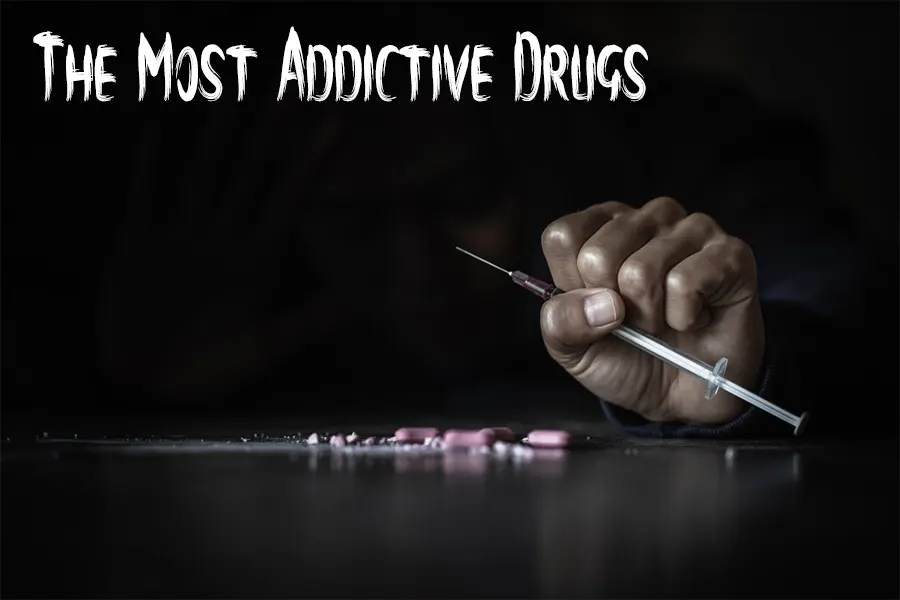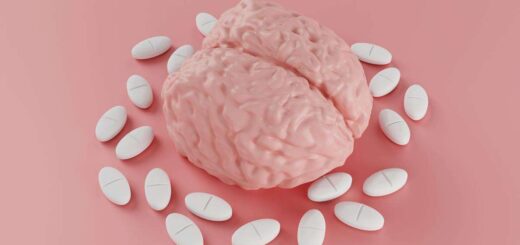What Are The Most Addictive Drugs?

Addictive drugs can be extremely harmful. They take control of us both physically and mentally. Leading to devastating consequences, drugs make it tough to quit.
It can be hard to deal with people who become addicted to drugs. The reason being, they have little to no control over their actions.
Whether or not a drug is illegal depends on how powerful it is. A few of the most addictive drugs are cocaine, alcohol, marijuana, and nicotine. One can avoid being an addict and stay safe, if they become fully aware of the potential risks of the drugs.
This article will help you figure out what drugs are and how they work. This will help you make healthy decisions so you can live a better life.
What is Drug?
A substance typically designed to influence your feelings and thoughts. Its mode of action should bring positive effects to your mind while healing your body.
It can be the work of doctors who prescribe them for your well-being. Sadly, some lurk in the dark, being sold illegally and causing harm.
From medicines that heal to alcohol, tobacco, etc. drugs come in many forms. And can be quite addictive. Understanding drugs is crucial to make informed choices for a healthier life. Let’s explore their impact together.
Disadvantage of Drug
Drugs can severely harm a person’s physical and mental health. This can create havoc in one’s personal, as well as professional life. Long-term users of drugs generally show symptoms of with-drawl, tolerance, and dependence.
And hence, avoiding the intake of drugs becomes difficult.
Also, drug abuse can make mental health problems worse, make accidents more likely, and create a strain on social and economic structures.
Let us understand what damage drug abuse brings on a biological level:
When we use addictive drugs, they react with the brain’s reward system, causing the release of a chemical called dopamine.
Dopamine is a neurotransmitter responsible for creating a sensation of pleasure. During an event of a rewarding situation, dopamine is released.
When drugs flood the brain with dopamine, they create an intense feeling of euphoria (feeling of extreme joy and happiness). As time goes on, the feeling becomes habitual. In order to experience it again, a person becomes dependent on the drug. But the normal activities that once used to bring similar pleasure lose their appeal.
Ultimately, the brain is deceived. One thinks that only the use of this substance can bring joy and nothing else is going to work!

Excessive drug use can lead to the following health issues:
- Memory problems
- Cognitive dysfunction.
- Loss of appetite
- Issues like increased anxiety and/or depression
- Trouble with sleep
- Nausea
- Headache
Unlock Your Full Potential with MODALERT 100MG! Explore its remarkable benefits with expert guidance
Most Addictive Drugs List
Heroin:
Heroin is derived from morphine. It is an opioid that has the ability to rapidly cross the blood-brain barrier. After which, it binds to opioid receptors in the brain.
This causes a rush of dopamine, which makes you feel very happy.
But because heroin’s effects don’t last long and people get used to it quickly, they take more of it and become very addicted. Also, the signs of heroin withdrawal can be very painful, which makes people want more heroin drugs, to avoid the pain.
Alcohol:
Alcohol is one of the most widely abused substances, even though it is legal and socially acceptable.
Alcohol affects different parts of the brain, which lowers inhibitions.
Increased alcohol consumption can lead to addiction and damage to vital organs.
Long-term use of alcohol can cause liver cirrhosis and problems with memory. People who drink alcohol lose balance and this can increase the chance of getting hurt or having an accident.
Methamphetamine:
This strong stimulant, which is also called “meth,” changes the amounts of dopamine and norepinephrine in the brain, causing a strong rush of happiness. Methamphetamine use can lead to a very strong addiction, and the drug’s harmful effects can damage the brain’s structure and cause long-term problems with thinking and memory.
Nicotine:
Nicotine, which is present in tobacco products, is incredibly addictive because it affects the brain’s reward system.
Nicotine intake can trigger neurotransmitter release leading to calming sensations.
With continued use, the brain becomes accustomed to the presence of nicotine, leading to dependence and making it difficult to quit. Nicotine addiction is a major factor contributing to tobacco-related health issues such as cancer, heart disease, and respiratory problems.
Cocaine:
This substance is a stimulant that boosts the levels of dopamine, serotonin, and norepinephrine in the brain, causing a pleasurable feeling known as a “high.”
The drug’s rapid effects and intense craving create a potential for addiction. Additionally, frequent cocaine use can lead to cardiovascular problems, anxiety, paranoia, and respiratory issues.
Conclusion:
Addictive drugs can be destructive, affecting individuals and society at large. Understanding the most addictive drugs and their potential consequences is important in promoting awareness, prevention, and helping addicts at the earliest.
Together, we can fight the damaging effects of drug abuse with education, help, and the right kind of care. This will make our society healthier and more robust. Let’s work together to lower addiction rates, offer support to those in need, and create a better future for generations ahead.
FAQ
[WPSM_AC id=6413]











